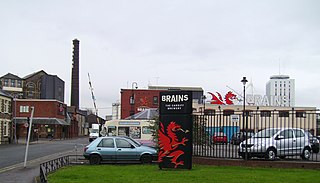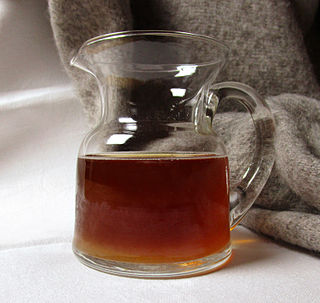
Craft beer is beer manufactured by craft breweries, which typically produce smaller amounts of beer than larger "macro" breweries and are often independently owned. Such breweries are generally perceived and marketed as emphasising enthusiasm, new flavours, and varied brewing techniques.

Traditional ginger beer is a sweetened and carbonated, usually non-alcoholic beverage. Historically it was produced by the natural fermentation of prepared ginger spice, yeast and sugar.

Beer was introduced to Canada by European settlers in the seventeenth century. The first commercial brewery was La Brasseries du Roy started by New France Intendant Jean Talon, in Québec City in 1668. Many commercial brewers thrived until prohibition in Canada. The provincial and federal governments' attempt to eliminate "intoxicating" beverages led to the closing of nearly three quarters of breweries between 1878 and 1928. It was only in the second half of the twentieth century that a significant number of new breweries opened up. The Canadian beer industry now plays an important role in Canadian identity, although globalization of the brewing industry has seen the major players in Canada acquired by or merged with foreign companies, notably its three largest beer producers: Labatt, Molson and Sleeman. The result is that Moosehead, with an estimated 3.8 percent share of the domestic market in 2016, has become the largest fully Canadian-owned brewer.

Dogfish Head Brewery is a brewing company based in Milton, Delaware founded by Sam and Mariah Calagione and, as of 2019, owned by the Boston Beer Company. It opened in 1995 and produces 262,000 barrels of beer annually.

Beer in Wales can be traced to the 6th century. Since the 2000s, there has been a growing microbrewery industry in Wales.

In the United States, beer is manufactured in breweries which range in size from industry giants to brew pubs and microbreweries. The United States produced 196 million barrels (23.0 GL) of beer in 2012, and consumes roughly 28 US gallons (110 L) of beer per capita annually. In 2011, the United States was ranked fifteenth in the world in per capita consumption, while total consumption was second only to China.

Beer is one of the oldest human-produced drinks. The written history of ancient Egypt and Mesopotamia records the use of beer, and the drink has spread throughout the world; a 3,900-year-old Sumerian poem honouring Ninkasi, the patron goddess of brewing, contains the oldest surviving beer-recipe, describing the production of beer from barley bread, and in China, residue on pottery dating from around 5,000 years ago shows that beer was brewed using barley and other grains.

Saison is a pale-colored ale that is highly carbonated, dry, fruity, spicy, and often bottle conditioned. It was historically brewed with low alcohol levels, but modern productions of the style have moderate to high levels of alcohol. Along with several other varieties, it is generally classified as a farmhouse ale.
Oskar Blues Brewery is a craft brewery with locations in Longmont, Colorado, Brevard, North Carolina, and Austin, Texas. The company began as a brewpub in Lyons, Colorado in 1997 and began brewing beer in the basement in 1999. In 2002, they became one of the first to put their own craft beer in cans. In 2012, they began marketing some of their craft beer in resealable aluminum containers, and in 2012, they expanded and established another brewery in Brevard, North Carolina.

Real Ale Brewing is a regional-sized American brewery founded in 1996 in Blanco, Texas. Their beers can only be found in Texas.

Southern Star Brewing Company is a brewery in Conroe, Texas, USA. Southern Star's president is Dave Fougeron, former head brewer of Houston-based Saint Arnold Brewing Company. The brewery distributes in Texas, Alabama, Indiana, Kentucky, Ohio and South Carolina.
Yakima Brewing & Malting Co, also known as Grant's Brewery Pub, was a brewpub founded by Bert Grant in Yakima, Washington. With its opening in 1982, it was regarded as the first in the United States since Prohibition. The company produced beer independently or under a parent through 2004.
Beer is produced through steeping a sugar source in water and then fermenting with yeast. Brewing has taken place since around the 6th millennium BC, and archeological evidence suggests that this technique was used in ancient Egypt. Descriptions of various beer recipes can be found in Sumerian writings, some of the oldest known writing of any sort. Brewing is done in a brewery by a brewer, and the brewing industry is part of most western economies. In 19th century Britain, technological discoveries and improvements such as Burtonisation and the Burton Union system significantly changed beer brewing.

Bell's Brewery, Inc. is an American craft brewing company, with operations in Comstock and Kalamazoo, Michigan. Bell's brews acclaimed beers such as Hopslam Ale, Oberon Ale, and Two Hearted Ale. It operates a brewpub and a store selling merchandise and homebrewing supplies at its Kalamazoo location. Begun as a homebrewing store in 1983, and producing beer since 1985, it is the oldest existing craft brewery in Michigan and the oldest craft brewery east of Colorado. As of 2021, it was the 6th largest craft brewery in the United States, and was the largest independently owned brewery in Michigan when founder Larry Bell sold the company to the subsidiary of the Japanese Kirin beverage group, Lion - an Australian producer of alcoholic beverages, at the end of 2021. The company also owns Upper Hand Brewery, a separately operated division in Escanaba, Michigan.

Gotlandsdricka is a traditional homebrewed alcoholic beverage made on the island of Gotland, Sweden. It is a kind of ale, closely related to the Finnish sahti, and Norwegian Maltøl with a smoky, bitter-sweet, spicy (juniper) flavor. It is similar to gruit.

Porter is a style of beer first brewed in London, England, in the early 18th century. The name is believed to have originated from its popularity with porters.

Women have been active in brewing since ancient times. From the earliest evidence of brewing in 7000 BCE, until the commercialization of brewing during industrialization, women were the primary brewers on all inhabited continents. In many cultures, the deities, goddesses and protectors of brewers were female entities who were associated with fertility.

Averie Swanson is an American brew master.

A barrel-aged beer is a beer that has been aged for a period of time in a wooden barrel. Typically, these barrels once housed bourbon, whisky, wine, or, to a lesser extent, brandy, sherry, or port. There is a particular tradition of barrel ageing beer in Belgium, notably of lambic beers. The first bourbon barrel-aged beers were produced in the United States in the early 1990s.

















